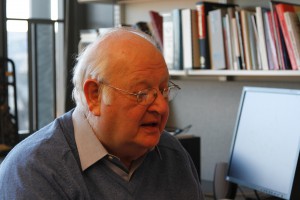 MADRID | British economist Angus Deaton was chosen Tuesday for the BBVA Foundation Frontiers of Knowledge Award in the category of Economics, Finance and Management in this fourth edition. Mr Deaton is professor at Princeton University (United States), and the jury selected him for
MADRID | British economist Angus Deaton was chosen Tuesday for the BBVA Foundation Frontiers of Knowledge Award in the category of Economics, Finance and Management in this fourth edition. Mr Deaton is professor at Princeton University (United States), and the jury selected him for
“his fundamental contributions to the theory of consumption, savings and the measurement of economic wellbeing.
“His research,” the jury added, “applies rigorous methods to important real world issues. Throughout his career, his work has been characterised by an attempt to understand empirical evidence in terms of a clearly articulated theoretical structure and the behaviors underlying the data.”
Deaton moved on from applying microeconometrics to analyse consumer demand to employ consumption as a key measure of welfare and poverty.
“He has helped us to a better understanding of the relationship between consumption and income, while showing that there are parts of this relationship that do not work and need to be reformulated.”
So in contrast to the traditional approach taking per capita income as the yardstick of development, Deaton proposed using per capita consumption with a system of reference based on health, wealth and well-being, which in the jury’s view, has made path-breaking contributions to development economics.
Another distinguishing trait of his work is the use of detailed surveys in preference to the aggregate data of National Accounts.
“He has focused particularly on the living standards of the poor in the developing world. He has championed the use of household surveys in these countries as an instrument for the better measurement of poverty and better understanding of poverty determinants.
“Deaton realised that GDP growth, consumption or car sales figures failed to offer a true picture of human well-being and that what was needed, especially in the case of the world’s poorest people, was more detailed information on consumption, calorie intake, spending on medicines or doctors’ or hospital visits.”
Gathering such data requires large-scale household surveys with targeted questionnaires that offer a closer picture of individual conduct in areas critical for human wellbeing. This level of detail and specificity allows for population segmentation and the subsequent assessment of policy impacts by reference to the economic behaviour captured by the survey.
A basic first step to estimate the number of poor people is to decide on a poverty line, which will depend on the price of the goods and services available for consumption. Deaton’s work on price indexes and the selection of poverty lines has proved highly influential, by calling into question the official figures wielded by certain countries and international organizations. For instance, the application of his methods to poverty research in India has provided firm evidence that not all of society is benefiting from the economic growth of this emerging power, spurring an intense social and political debate.
Another of his current concerns is the crisis and its repercussions:
“What I am doing right now is to try to measure the crisis in different countries –European and South American, among others– and decide what steps we can take. In my opinion, there is little we can do to arrest this crisis. We have to be conscious of the moment in which we are living and accept the change of conditions many families are unfortunately going through in countries all around the world.”
The name of the new laureate was announced this morning in the Marqués de Salamanca Palace, Madrid headquarters of the BBVA Foundation, at an event attended by jury chair Guillermo Calvo of Columbia University and jury secretary Peyton Young from the University of Oxford, accompanied by Rafael Pardo, Director of the BBVA Foundation.





Be the first to comment on "British economist Angus Deaton awarded by BBVA Foundation"